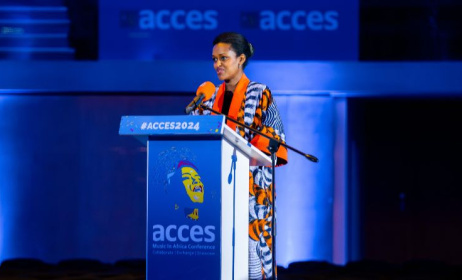ACCES 2024 interview: CAPASSO’s Jotam Matariro
In the vibrant landscape of African music, the Composers, Authors and Publishers Association (CAPASSO) stands out for its push for fair compensation and recognition of artists and creators. As a collective management organisation (CMO), CAPASSO has revolutionised music collection on the continent, bridging gaps between creators, platforms, and audiences. Through strategic partnerships and innovative approaches, CAPASSO is shaping the future of African music, ensuring that creators receive the value they deserve.
 CAPASSO CEO Jotam Matariro.
CAPASSO CEO Jotam Matariro.
To that end, CAPASSO has partnered with the Music In Africa Conference for Collaborations, Exchange and Showcases (ACCES) taking place in Kigali, Rwanda on 14, 15 and 16 November 2024. The CMO will present a panel discussion titled Harmonising the collection of music royalties in Africa, which will feature industry professionals from South Africa, Malawi, Rwanda and Algeria.
Music In Africa spoke with Matariro about the partnership between CAPASSO and ACCES 2024, his views on music licensing and collection across the continent and the CMO’s commitment to preserving African music culture and intellectual property rights.
MUSIC IN AFRICA: Can you share an overview of CAPASSO’s role in music collection in Africa, and how it benefits artists and creators?
MATARIRO: CAPASSO is the only pan-African CMO. We achieved this role through collaboration with various other African countries. CAPASSO collects and distributes royalties across the continent in collaboration with 32 other African CMOs. Through CAPASSO, digital streaming platforms (DSPs) are able to obtain a musical works licence in these 32 countries through one agreement and this has allowed them to launch their streaming services seamlessly across the continent. CAPASSO’s strategy is to make sure African musicians are fairly compensated by all platforms and get payments in the shortest possible time at a minimal cost-to-income ratio.
How does CAPASSO’s partnership with ACCES 2024 enhance its mission to protect and promote African music creators’ rights?
CAPASSO has been involved with ACCES since the second edition in Kenya in 2019. As an organisation, we realised how our pan-African strategy feeds into what ACCES is doing and this year we decided to bring three other African CMOs to access for the panel discussion. The discussion aims to explore the role of collective management in Africa and why African creators are responsible for their own collective management. CAPASSO is grateful to ACCES for providing this platform.
What impact will CAPASSO’s partnership with ACCES 2024 have on the African music industry, and what future plans do you have for collaboration?
CAPASSO is hopeful that African creators are going to realise their importance in collective management and in shaping the CMO of the future that adapts to the changing music business environment not only for themselves, but for future generations. This will be key in preserving the African music culture that is so abundantly rich. We look forward to a continued partnership with ACCES going forward by committing to sponsor at least one panel annually.
How does CAPASSO’s partnership with ACCES 2024 influence its strategy for tackling piracy and copyright infringement in Africa?
Through the collaboration with ACCES, CAPASSO seeks to have a consensus on good legislative reform across the continent that will help address online piracy and stream ripping. The legislation need not necessarily be the same but must aim to address this social ill. It is our belief that search engines should be held accountable for providing a platform for infringing sites.
How can CAPASSO’s collection model evolve to accommodate the rapidly changing music industry in Africa? What innovations are you exploring?
CAPASSO’s collection model has already evolved a lot, and the model we use is one of its kind. There is none around the world. Formed as a mechanical (reproduction) rights organisation, CAPASSO has evolved to become a mechanical rights organisation as well as a digital licensing hub. While performing our CMO business, we also compete with rights management entities that service various CMOs in different countries as stated above. No organisation does this dual role in the world at the moment except CAPASSO. The CAPASSO working culture is that of non-rigidity and allows for flexibility, as the music business has become very volatile. The goals always remain the same, which is the preservation of African music intellectual property rights to contribute to the African cultural and creative industry, but what changes is the way these goals are achieved. The goals will always remain fair compensation and cultural preservation.
How would this partnership facilitate collaboration and knowledge-sharing between African and international music industry professionals, and what benefits do you think would arise from this exchange?
As an African organisation, we are more aware of the African business operating environment. Our relationships across the continent, together with the collaboration with ACCES, provide business opportunities to tech companies, music publishers and other entrepreneurs around Africa and the world to penetrate the market. CAPASSO is the custodian of correct music consumption patterns across different platforms in Africa, and we are the go-to company for multi-territorial licensing on the continent.
Can you discuss the nuances of working in different African countries each with unique regulatory frameworks and industry structures? How does CAPASSO adapt its approach to accommodate these differences?
While we may have different regulatory frameworks across the continent, what we have realised is that we have a common goal. When you have a common goal, it means you are moving in the right direction and are all aspiring to reach the same destination. The moment we realised that, we then found the similarities and complementary clauses in our legislative frameworks and used that as the reason for collaboration and mutual benefit for all of us. Not only did we manage to work together, but also managed to break the colonial language barriers as sub-Saharan Africa, West Africa and North Africa are all part of the CAPASSO hub.
What educational initiatives or resources does CAPASSO offer to help African artists and creators understand their rights and navigate the music industry?
CAPASSO takes part in various workshops across Africa in collaboration with local CMOs and streaming companies. Recently, we had a workshop with YouTube targeted at songwriters and how they can maximise earnings on the YouTube platform.



























Commentaires
s'identifier or register to post comments